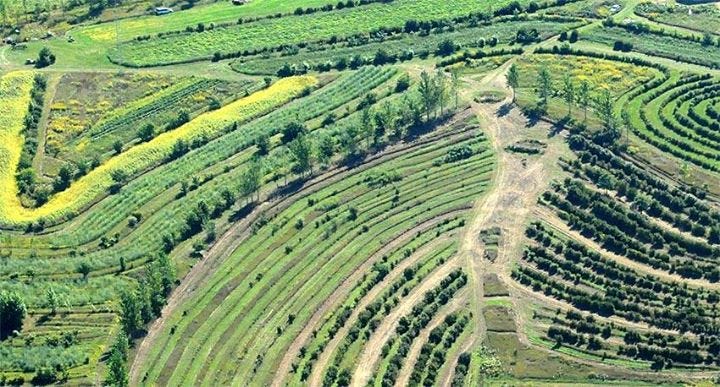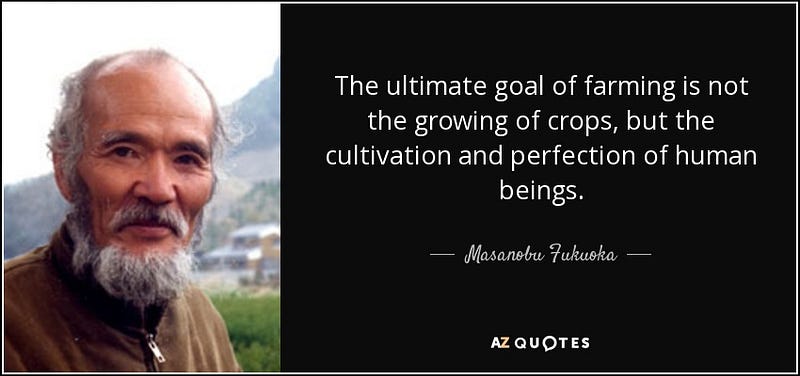Permaculture System Design and Bitcoin: Part 1 Overview

Permaculture is a method of systems design that is codified via a set of core tenants and principles of design.
I started studying Permaculture system design around the same time I became aware of Bitcoin back in 2012 and took a Permaculture design course in 2014. Permaculture was created by the late Bill Mollison alongside David Holmgren when they began to see the devastation that modern agriculture brought to once abundant arable lands.
Keyline Design

There is no such thing as “flat land”, all land has differing levels of elevation and grades across its entirety. In traditional farming rain would it the land crops were on, it would quickly wash from the high to the low points, and as the water gained speed it would wash away precious topsoil, minerals, fertilizers, etc. to the low points on the land and eventually be washed away into the streams, lakes and eventually into the oceans. North America is losing topsoil 10x faster than it can be replenished due to erosion and many of the DEADLY algae blooms along the coast are due to fertilizers runoff. This is energy and resources that are not being captured, but due to inefficient system design are lost and wasted.
Yeoman’s Keyline design in a very basic sense if to create water catchment systems in the form of ditches built on contour with the land and planted with vegetation that can hold the soil. The Energy/resource, the rain, is then caught in these catchment ditches, and slowly disperse through the land the areas below it. This also slows down the water and decreases erosion with any loss of soil being caught in the ditches as well. It is a perfectly efficient system.
Masanobu Fukuoka

Masanobu Fukuoka was the son of a wealthy land owner and attended University and was trained as a microbiologist and agricultural scientist. He came to doubt the ideas of Western agricultural science and resigned from his job and went home to work the family farm. Be began to experiment with various practices on his organic citrus farm and developed a system of “natural farming”. His experiments were interrupted by government policies during WW2 and the forced redistribute of lands by occupying American forces in post war Japan and was left with only 3/8 of an acre of rice land and citrus orchards. He came up with numerous practices of non-intervention and working alongside/not against nature practices that heavily influence the permaculture mindset.
Permaculture
With these great men that came before them Bill and David began to form a radically new idea, that of both permanent culture for agriculture but also for sustainable human habitats. The human system melding with the system of nature. They wanted to find a way that they could live complimentary to nature vs. one of conflict with nature
Permaculture Ethics
- Earth Care
- People Car
- Return of Surplus
Earth care is about to create practices that allowed for the larger system, the Earth, to operate efficiently and healthy. Small systems within the larger system cannot flourish if the larger system is dying or broken.
People Care is creating systems that benefit humanity, creating more resources and access for their existence. This may start to sound very hippy dippy and semi-socialist, but I assure you that it’s not. I’m the farthest thing from being a supporter of those ideologies, so please bear with me, this will all come to make more sense later as we incorporate this into system designs at a larger level.
Return of Surplus is about self-regulation of intakes and using our wastes in a system in a positive way to be recycled into usefulness for the rest of the system. Some on the farther left of the movement have attempted to re-brand this ethic “fair share” but the attempt to hijack the principles of design to justify inefficient centrally planned authoritarian regimes flies in the face of the spirit of Permaculture itself. Socialism is fighting nature, it’s an attempt to bend the will of the world and the human spirit through the threat of violence. That is NOT Permaculture.
Design Principles
Alongside the ethics there are 12 is principles. I had previously tweeted a very basic take on each of these principles, and the point of this Permaculture series will be to expound in detail on each of these principles and how can be applied to Bitcoin and the coming fully immersive digital age.
- Observe and Interact
- Catch and store energy
- Obtain a yield
- Apply self-regulation
- Use and value renewable resources and services
- Produce no waste
- Design from patterns to details
- Integrate rather than segregate
- Use small and slow solutions
- Use and blue diversity
- Use edges and value the marginal
- Creatively use and respond to change
There are other concepts that we will get into later such as layers, guilds and zones within a system, but we will get to those later.
As we move forward in this series, I want you to keep your mind in the framework of systems design and how this applies to society and the Bitcoin system. How can you apply these lessons to those larger concepts but also apply them in your own life to better your ability to react to change, spot opportunity and create more efficient, less wasteful systems in your home, relationships, business, etc.
The next part in the series will be looking at the first principles of design, Observe and Interact.
Listen to the Podcast
Latest Episodes
Episode 73: Fran Finney
Episode 73 Fran FinneyFran Finney is the widow of the late great Hal Finney. She was his wife for over 30 years and has since become a relentless advocate for ALS research & care. This is her first interview since 2014. Today I discuss Hal & Frans early...
Episode 72: The Story Of e-gold
Episode 72 The Story Of egoldDr. Douglas Jackson is a board-certified oncologist, entrepreneur the co-creator of e-gold and is currently working on the next generation of that project. Today I discuss His background and journey How egold got started...

0 Comments